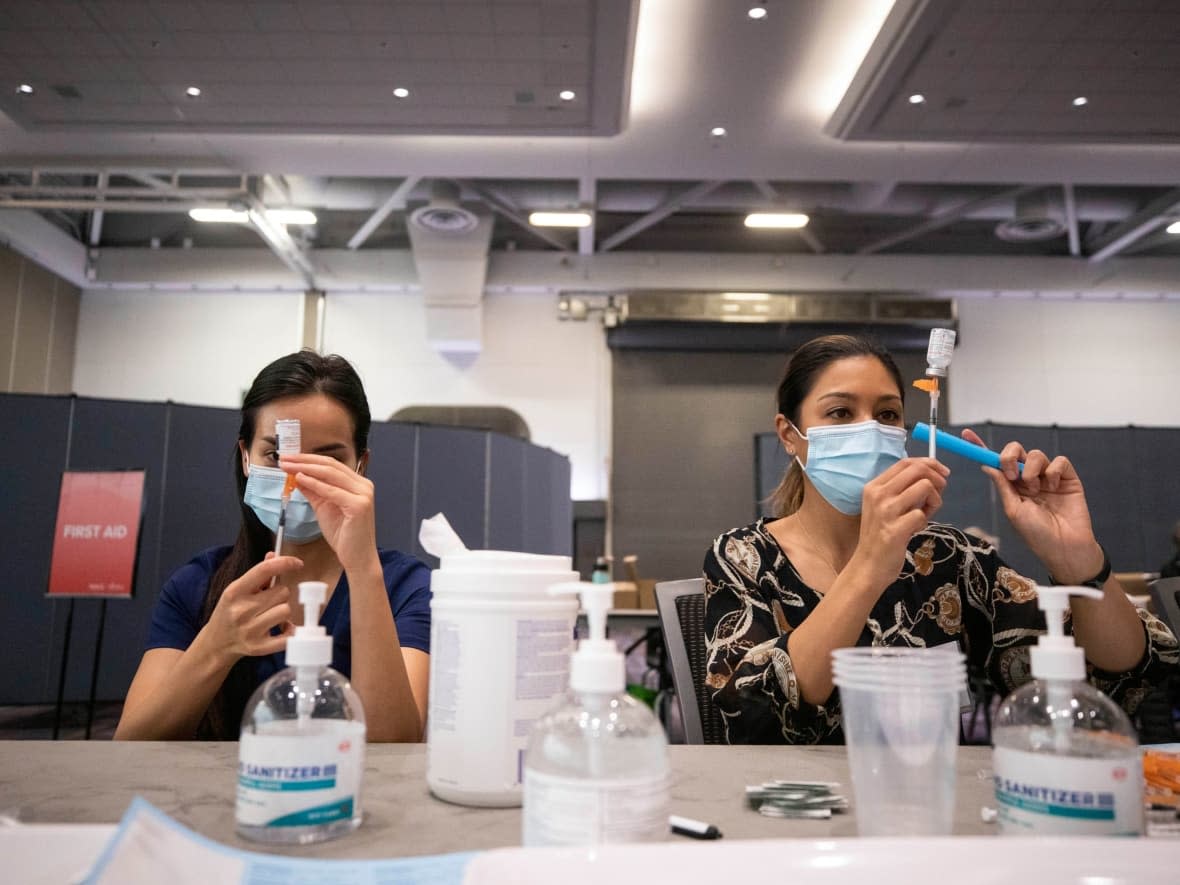Canada's vaccine advisory body recommends 'rapid deployment' of 4th doses for 80+

Canada's National Advisory Committee on Immunization (NACI) is now strongly recommending the "rapid deployment" of second COVID-19 booster shots for seniors aged 80 and up in the community and those living in long-term care and other congregate settings.
In NACI's latest statement, released on Tuesday, the advisory body stressed the need to ward off "protection against severe disease potentially decreasing over time following the first booster dose" and mitigate the risk of highly transmissible variants which can evade immunity.
Have a question or something to say? CBC News is live in the comments now.
While the "greatest benefit" is expected in adults 80 years of age and older, regions may also consider offering a second COVID-19 booster dose to adults between 70 to 79 years of age living in the community, NACI's statement continued.
"At the end of the day, this is the cohort that is by far the most likely to land in hospital and have a more serious outcome, and this is the cohort that would be most likely to benefit from it," Toronto-based infectious diseases specialist Dr. Isaac Bogoch told CBC News following the release of the updated guidance.
'Not simply a question of time'
The committee also suggested the provinces should provide people with a second booster shot six months after their previous dose, but that a shorter interval "may be warranted in some individuals in the context of the rapidly evolving pandemic."
McMaster University associate professor Dr. Zain Chagla said that wiggle room to offer boosters in a shorter timeframe makes sense given the high levels of virus circulating in Canada right now as the country experiences another spike in COVID-19 cases.
"It's not simply a question of time since third dose, but also what's going on in your community," he said.
"If you're in a wave, then don't just wait until the six months, you can start administering it early to that population recognizing again that they're at the highest risk of complications."
WATCH | Ontario in the 6th wave of COVID-19, experts say:
Alyson Kelvin, a virologist at the Vaccine and Infectious Disease Organization (VIDO) at the University of Saskatchewan, said the guidance is in line with clinical data showing fourth doses bring waning antibody levels back up to protect against severe disease.
"The picture starting to emerge is that immunity wanes between five and six months after COVID-19 vaccination. This is similar to what we see for the seasonal influenza vaccine," she said.
"We only get the influenza vaccine on a yearly basis because the virus is seasonal with cases rising only in the winter months. SARS-CoV-2 is currently a consistent problem, suggesting the need for an alternative boost schedule."
Patchwork approach to boosters
In December, NACI previously recommended a fourth shot only for moderately to severely immunocompromised individuals, noting data on additional boosters was "limited" at the time.
Since then, there's been a patchwork approach to offering fourth doses across the country, with some regions following that early guidance while others are offering additional shots more broadly.
In Saskatchewan, for instance, fourth shots are available for residents of long-term care, special care and personal care homes five months after their third dose.
Fourth doses will also soon be available to those over 60 in Ontario and over 70 in British Columbia, while Quebec currently offers access to anyone aged 80 and up.
WATCH | U.S. approves 4th dose of COVID-19 vaccine for older Americans:
Already, those additional shots seem to be making a difference, Bogoch noted.
"Look at long-term care deaths related to COVID: not outbreaks, but deaths. Our long-term care sectors are doing rather well because of that," he said. "Outbreaks are one thing, right? No one's going to pretend that these vaccines are going to completely stop an outbreak, but they do prevent deaths for sure."
U.S. offers 4th dose for those 50 and up
NACI's updated guidance follows U.S. federal regulators recently authorizing a fourth dose of Pfizer-BioNTech's COVID-19 vaccine for Americans 50 and older, and for anyone aged 12 and up with compromised immune systems.
U.S. data showed that during the recent Omicron surge, people who were boosted were 21 times less likely to die from COVID-19 compared to those who were unvaccinated, and seven times less likely to be hospitalized.
NACI also isn't ruling out additional boosters for the general population — noting broader use may be required if there are concerning trends in the course of the pandemic.
But for now, Bogoch agreed with the committee's position to prioritize additional booster shots for seniors specifically.
"You just don't see vaccinated 40 and 50 year olds, without underlying medical conditions, in hospital all that frequently," he said.
"But you do see frail elderly individuals who have been vaccinated in hospital and if this fourth dose can help keep people out of hospital, we're doing something right."
The latest NACI guidance notes a second booster dose may also be considered for adults younger than 70 years of age in or from First Nations, Métis, and Inuit communities, in collaboration with health-care and public health partners.
The advisory committee said it's also reviewing existing recommendations for COVID-19 vaccine booster doses for younger adults under 50, and adolescents 12-to-17 years of age, and "will release a statement with updated advice in the coming weeks."


